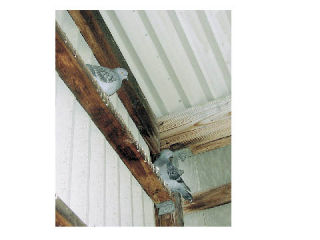Sailboats docked in the open at the Oak Harbor Marina might endure the occasional discharge of bird ordnance or greet a curious otter with an IQ higher than most homo sapiens, but the fowl moored undercover are perfectly centered in pigeons’ cross-hairs.
The City Council last week approved a contract with the U.S. Department of Agriculture to begin solving the wildlife problems that have plagued the marina and led to ongoing boating community complaints.
The contract was previously approved by the council in February, but the USDA modified the required paperwork.
The wildlife control will focus, at least initially, on pigeons and gulls that leave their unpleasant calling cards all over the docks while also causing health and safety problems.
“Right now we’re trying to focus on pigeon control,” Harbormaster Mack Funk said.
The Wildlife Service is implementing a specific program to help stave off the nuisance species threatening humans and property.
Pigeons are the first order of business because of their tendency to seek cover as they roost at night to avoid predators. Once the “no vacancy” sign underneath the marina’s two piers was lit, the birds began using the covered area. Unfortunately their self-preservation translates to “free pigeon love” and a proliferation of the species.
“They really like our covered moorage,” Funk said. “They roost and then they reproduce. It’s been a very big problem. Marina customers have complained to both the State Veterinarian and the Island County Health Department about the ‘fowl’ conditions at the marina.”
The marina staff spends at least two hours per day cleaning the docks, the harbormaster said. From December through April, one of the marina’s “live-aboards” spent more than 145 volunteer hours helping clean the docks. Inmates from the Monroe Correctional Facility also lend hands through a work release program.
“The marina is much cleaner now than it was last fall, but it requires a significant amount of time,” said Funk.
The city is fortunate to have Wildlife Service representative and Oak Harbor resident Fred Goodman as the agency’s project “go to man.” With more than 20 years of experience, the specialist will intermittently follow the peaks and lows in bird activity throughout the year.
“Fred has an excellent reputation and he knows his business,” said Funk, adding that Goodman described the marina’s pigeon population as a serious but surmountable problem that can be easily managed.
As Funk said, “control” will entail trapping and removing the wildlife using the “safest and most effective tools and techniques available.” The agency’s technical assistance may also take the form of education.
The estimated cost of the program is $10,000, which includes salaries and benefits as well as supplies, vehicle use and program services.
If successful, Funk said the money will be well spent. Although working around wildlife is one of the perks associated with the harbormaster post, he added that some species take liberties adversely affecting the enjoyment and health of marina users.
Feral pigeons, although seemingly harmless — and irritable bowels notwithstanding — can carry myriad diseases that won’t be cured with over-the-counter medication. The species has been “identified with mycotic, bacterial, protozoal, chlamydial, rickettsial, and parasitic diseases,” wrote author Walter Weber.
In addition to pigeons, the harbormaster said other seasonal and therefore protected species like Black Turnstones are a problem. In some cases, seagulls can be deterred by using decoys or placing an actual carcass in an area where the birds congregate. The scare tactics, however, require permits.
“Last year we bought sound machines that mimic a seagull being attacked,” Funk said. “That worked for a while until they caught on.”
Highly intelligent river otters, an unprotected species, have also made the Wildlife Service’s list.
“They get onto the boats where it’s warm and really cause a lot of damage,” Funk said. “And they certainly have their favorite boats.”
Langley resident Michele Bishai has thus far avoided otter problems on her family’s sailboat moored in Oak Harbor. Her hometown was a different story.
“We had a horrendous problem with otters in Langley,” she said. “They are extremely intelligent. We would zip up the awnings and even tie knots, but the otters would undo the knots and then push up the zippers on the awnings.”
Goodman advised the marina staff at a recent meeting that eliminating otters at the marina will be virtually impossible, but that boat owners should take all steps to eliminate access points onto vessels. He added that otters are inherently lazy and simply blocking their pathways is the best way to keep them away.
To deal with rodents, for which every day is open season, the marina has an ongoing rodent control contract with Surety Pest Control.
“My experience is that when dealing with challenging problems, it’s best to use professional people,” Funk said.



